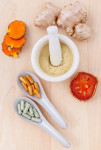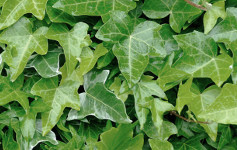Getting rid of a Chesty Cough
Winter is well and truly upon us, and with it, so many people seem to have picked up a cough this year, in particular a Chesty Cough. With statistics showing adults catch up to 4 colds per year, and children up to 10 (1), it’s worth knowing how to get rid of them quickly, before they migrate into something more serious. We’ve heard quite a bit about the benefits of Ivy leaf as a powerful ingredient to relieve chesty coughs and relieve chest congestion. We spoke to Gerald Quigley, leading Accredited Herbalist and Community Pharmacist, to understand what a Chesty Cough is, and how we can best fight it, and the benefits of Ivy leaf. Here is what he had to say.

What is a chesty cough and what are the causes?
A “chesty” or “productive” cough is a sign of irritation and congestion in the bronchial airways and of the body’s attempt to expel it. It is usually a typical symptom of the common cold and an approach to fighting a chesty cough involves soothing and supporting the body in clearing chest congestion so it can restore normal function.


How do Chesty Cough medicines ease the symptoms?
Rather than simply seeking to suppress the cough, the aim is to help the eliminative process by encouraging the clearance of mucus from the chest and helping the cough to do its job more effectively.
The body has an ingenious and in-built “mucociliary escalator” that brings bronchial secretions up to the throat as phlegm, but this self-cleansing process can be hampered by:
- Excessive mucous production overloading the escalator and causing congestion in the chest, or
- The mucous secretion is thickened and trapped.
Can you head off a Chesty Cough at the first sign of symptoms, or is it going to hit by then?
Identifying the symptoms as early as possible is important. A cough due to a cold is usually preceded by a sore throat and/or nasal congestion. Using a gentle herbal option to soothe any irritated surfaces in the throat makes sense. Ensuring that breathing passages are as clear as possible is the main objective. Avoiding triggers like cold air (especially immediately after leaving say, a warm room) for example. Using a herb like Ivy leaf supports efficient lung function, so is worthwhile.


I’ve read a bit about Ivy leaf. How does this herbal power work to relieve coughs and chest congestion during a cold?
The research and clinical trials around Ivy leaf extract show three main actions: it encourages a productive cough, it helps thin and clear mucus from the airways, and it helps act as a bronchodilator to open airways and ease breathing symptoms associated with a cold. The clinical evidence also shows it’s suitable for both adults and children over 2 years.
What Hygiene rules should you follow to minimise your chance of catching a cold, and reduce the length and severity of symptoms?
The pathway to catching a cold is two-fold. Washing your hands before eating minimises the risk of hand-borne transfer of germs, and keeping your hands away from your mouth is additional insurance. Irrigating your nose with isotonic saline with no added preservatives helps ensure that inhaled matter is washed away. Using a tissue which can then be discarded, is preferred to a reusable handkerchief that can retain germs.


Chesty coughs can be quite painful. What else do you recommend to relieve the discomfort of a Chesty Cough?
Keeping hydrated and the airways moist through a range of your favourite options are important. Room temperature water, herbal teas and inhaling essential oils may help alleviate some of the discomfort. Chest pain during or after coughing needs a medical assessment because there really shouldn’t be pain. In general, when pain arises, have it assessed. The overriding issue here is to support the regular functions of the lung.
We hope these tips help you get rid of chesty cough and stay healthy this Winter. What are your tips for getting rid of a cough (chesty or otherwise)? Let us know in the comments below.
Sources for References:
(1) NPS MedicineWise https://www.healthdirect.gov.au/colds-and-flu-statistics


